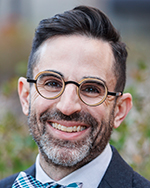Above: Tintype photograph by Will Wilson. Adam W. McKinney stands as Mr. Fred Rouse in front of the former Ku Klux Klan Klavern No. 101 Auditorium

Warren Hoffman
What is Justice?
In Hebrew, the word for justice is tzedek, which connotes a sense of righteousness and fairness. In English, at least in the United States, we perhaps think of justice as it’s connected to the legal system: “Justice shall be done,” indicating that past wrongs will be righted, victims vindicated, and criminals punished. More recently, I’ve been thinking about justice, vis-à-vis the AJS, in terms of equity, the E part, in the now common acronym DEI (Diversity, Equity, and Inclusion). When the AJS first began its work in earnest around diversity four years ago, it established a diversity and inclusion taskforce.
Out of their work, the taskforce developed a Scholars of Color fellowship program, which will help create an initial sense of community for scholars of color in the organization; helped us introduce a number of important accommodations around accessibility at our annual conference; and encouraged us to develop a standing DEI committee, which we have done. For the third year, the AJS has also offered a summer writing group geared toward women, transmen, and nonbinary folks to help increase the number of submissions individuals from these demographics make to scholarly publications.
Since we first created the DEI taskforce in 2018, the discourse around diversity has shifted to better understand the equity piece of the justice equation. We need to do more than simply make our spaces more diverse. We need to account for various societal inequities that have made such diversity and inclusion difficult—if not impossible—in the first place. The AJS’s newly formed DEI standing committee, chaired by Julia Watts Belser, is helping AJS leadership think through and act on this issue of equity. This involves thinking about groups that may have not felt included by our initial DEI work.
In addition to considering wider representation, we also have begun to think about equity in financial terms. As we look to 2023, the AJS board has made the decision not to raise conference fees for members who make the least amount of money. We recognize that conference costs have risen in all areas due to inflation, and we will be looking to scholars who have the means—whether through their institutional funding or their own personal finances—to help us make up the difference. We know too that funding for conference attendance is increasingly hard to come by for early-career scholars and contingent faculty. This year, the AJS received close to 200 requests for travel grant support, the most applications we have ever received. The AJS board originally aimed to allocate $46,000 for individual travel grants, which includes money from outside funders. Because of the high number of applications, in August the board authorized an additional $6,000 of spending from the AJS’s own reserves so that we could help nearly every applicant with a grant of some size. Being equitable has a real financial component and the AJS is committed to investing its resources into helping its members.
Going forward, you will see a renewed call for donations from me and AJS President Robin Judd. For 2023, we’re looking to nearly double our donations from $40,000 a year to $70,000. We fundraise not simply because it’s what nonprofits do. We fundraise precisely to help bring about more equity and justice in the AJS. It’s with these funds that we can support more travel grants and other programs that enable inclusion. If you are able to do so, we hope you’ll join us in this campaign so that the AJS can do its share to make the world of Jewish Studies a more just and equitable place.
Warren Hoffman
Association for Jewish Studies